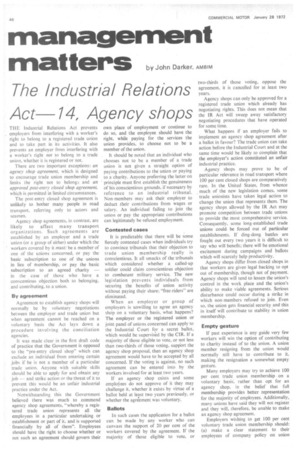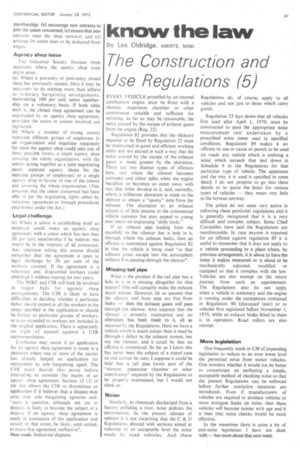management
Page 48

Page 49

If you've noticed an error in this article please click here to report it so we can fix it.
matters by John Darker AMBIM
The Industrial Relations Act 14, Agency shops
THE Industrial Relations Act prevents employers from interfering with a worker's right to belong to a registered trade union and to take part in its activities. It also prevents an employer from interfering with a worker's right not to belong to a trade union, whether it is registered or not.
There are two important exceptions: an agency shop agreement, which is designed to encourage trade union membership and limits the right not to belong; and an approved post-entry closed shop agreement, which is permitted in limited circumstances.
The post-entry closed shop agreement is unlikely to bother many people in road transport, referring only to actors and seamen.
Agency shop agreements, in contrast, are likely to affect many transport organizations. Such agreements are established by an employer and a trade union (or a group of either) under which the workers covered by it must: be a member of one of the unions concerned, or pay the basic subscription to one of the unions in lieu of membership, or pay the basic subscription to an agreed charity — in the case of those who have a conscentious objection both to belonging. and contributing, to a union.
By agreement
Agreement to establish agency shops will normally be by voluntary negotiations between the employer and trade union but when agreement cannot be reached on a voluntary basis the Act lays down a procedure involving the conciliation agencies.
It was made clear in the first draft code of practice that the Government is opposed to the "pre-entry closed shop" which can exclude an individual from entering certain jobs if he is not a member of a particular trade union. Anyone with suitable skills should be able to apply for and obtain any job and strike action or the threat of it to prevent this would be an unfair industrial practice under the Act.
Notwithstanding this the Government believed there was much to commend agency shop agreements, "whereby a registered trade union represents all the employees in a particular undertaking or establishment or part of it. and is supported financially by all of them". Employees should have the right to choose whether or not such an agreement should govern their own place of employment or continue to do so, and the employee should have the right, while paying for the services the union provides, to choose not to be a member of the union.
It should be noted that an individual who chooses not to be a member of a trade union is not given a straight option of paying contributions to the union or paying to a charity. Anyone preferring the latter on principle must first establish the genuineness of his conscientious grounds, if necessary by reference to an industrial tribunal. Non-members may ask their employer to deduct their contributions from wages or salary. An individual failing to join the union or pay the appropriate contributions can legitimately be refused employment.
Contested cases
It is predictable that there will be some fiercely contested cases when individuals try to convince tribunals that their objection to trade union membership really is conscientious. It all smacks of the tribunals which considered whether a called-up soldier could claim conscientious objection to combatant military service. The new legislation prevents individuals from securing the benefits of union activity without paying their share: "free-riders" are eliminated.
When an employer or group of employers is unwilling to agree an agency shop on a voluntary basis, what happens? The employer or the registered union or joint panel of unions concerned can apply to the Industrial Court for a secret ballot, which would be supervised by the CIR. If a majority of those eligible to vote, or not less than two-thirds of those voting, support the agency shop proposal, then an agency shop agreement would have to be accepted by all concerned. If the voting is against, no such agreement can be entered into by the workers involved for at least two years.
If an agency shop exists and some emplqees do not approve of it they may challenge it, whether it exists by virtue of a ballot held at least two years previously, or whether the agreement was voluntary.
Ballots
In such cases the application for a ballot can be made by any worker who can canvass the support of 20 per cent of the workers covered by the agreement. If the majority of those eligible to vote, or two-thirds of those voting, oppose the agreement, it is cancelled for at least two years.
Agency shops can only be approved for a registered trade union which already has negotiating rights. This does not mean that the IR Act will sweep away satisfactory negotiating procedures that have operated for some time.
What happens if an employer fails to implement an agency shop agreement after a ballot in favour? The trade union can take action before the Industrial Court and at the same time would be likely to complain that the employer's action constituted an unfair industrial practice.
Agency shops may prove to be of particular relevance in road transport where 100 per cent closed shops are comparatively rare. In the United States, from whence much of the new legislation comes, some trade unionists have taken legal action to change the union that represents them. The agency shops allowed by the IR Act may promote competition between trade unions to provide the most comprehensive service. Consequently, some long-established trade unions could be forced out of, particular establishments. If ding-dong battles are fought out every two years it is difficult to say who will benefit; there will be emotional excitement during campaigns and ballots which will scarcely help productivity.
Agency shops differ from closed shops in that workers are given legal backing to opt out of membership, though not of payment. Agency shops will tend to lessen the union's control in the work place and the union's ability to make viable agreements. Serious disturbance could occur during a Strike in which non-members refused to join. Even so, the union gets financial security and this in itself will contribute to stability in union membership.
Empty gesture
If past experience is any guide very few workers will win the option of contributing to charity instead of to the union. A union member resigning from the union would normally still have to contribute to it, making the resignation a somewhat empty gesture.
Many employers may try to achieve 100 per cent trade union membership on a voluntary basis, rather than opt for an agency shop, in the belief that full membership provides better representation for the majority of employees. Additionally, many unions have said they will not register and they will, therefore. be unable to make an agency shop agreement.
Employers wishing to get 100 per cent voluntary trade union membership should: (a) make a clear statement to their employees of company policy on union
membership; (b) encourage new entrants to join the union concerned; (c) ensure that new entrants meet the shop steward; and (d) arrange for union dues to be deducted from wages.
Agency shop issue The Industrial Society foresees three situations where the agency shop issue might arise:
(a) Where a pre-entry or post-entry closed shop has previously existed. Here it may be necessary to do nothing more than adhere to ordinary bargaining arrangements, maintaining 100 per cent union membership on a voluntary basis. If both sides wish it, the closed shop agreement can be superseded by an agency shop agreement, provided the union or unions involved are registered.
(b) Where a number of strong unions represent different groups of employees in an organization and negotiate separately for them the agency shop could take one of three possible forms: a single agency shop covering the whole organization, with the unions acting together as a joint negotiating panel: separate agency shops for the separate groups of employees; or a single agency shop in favour of one of the unions and covering the whole organization. (This assumes that the union concerned has been able to get the negotiating rights either by voluntary agreement or through procedures established under the Act.)
Legal challenge (c) Where a union is establishing itself an employer could make an agency shop agreement with a union which has less than 50 per cent membership if he believes this would be in the interests of all concerned. Any employer taking this course should remember that the agreement is open to legal challenge by 20 per cent of the workers covered. If the agreement is a voluntary one, disgruntled workers could challenge it without waiting for two years.
The NIRC and CIR will both be involved in major bids for agency shop arrangements. The CIR is likely to have difficulties in deciding whether a particular ballot should extend to all the workers in the ranee specified in the application or should be limited to particular groups of workers, or even extended to workers not included in the original application. There is apparently no right of appeal against a CIR recommendation.
Confusion may occur if an application for an agency shop agreement is made in a situation where one or more of the parties has already lodged an application for recognition as sole bargaining agent. The CIR must decide this point before attempting to consider the merits of an agency shop agreement. Section 12 (1) of the Act allows the CIR to discontinue an application if it believes that a dispute may arise over sole bargaining agencies and: "such a question, although not yet in dispute is likely to become the subject of a dispute if an agency shop agreement is made in pursuance of the application and would. in that event, be likely, until settled, to make that agreement ineffective".
Next week: Industrial disputes.
























































































